Thursday, August 18th 2016

AMD Demos Breakthrough Performance of the ZEN CPU Core
At an event last night in San Francisco, AMD provided additional architectural details and a first look at the performance of its next-generation, high-performance "Zen" processor core. AMD demonstrated the "Zen" core achieving a 40% generational improvement in instructions per clock, delivering a landmark increase in processor performance.
During the event, AMD demonstrated an 8-core, 16-thread "Summit Ridge" desktop processor (featuring AMD's "Zen" core) outperforming a similarly configured 8-core, 16-thread Intel "Broadwell-E" processor when running the multi-threaded Blender rendering software with both CPUs set to the same clock speed. AMD also conducted the first public demonstration of its upcoming 32-core, 64-thread "Zen"-based server processor, codenamed "Naples," in a dual processor server running the Windows Server operating system."The performance and efficiency of our 'Zen' core showcases AMD at its best," said Dr. Lisa Su, president and CEO of AMD. "Over the last four years we have made significant investments to develop a high-performance, multi-generation CPU roadmap that will power leadership products. Customer excitement for 'Zen' continues to grow as we make significant progress towards the launch of new products that will span from the datacenter to high-end PCs."
The "Zen" processor core features multiple architectural advances designed to increase the performance, throughput, and efficiency of AMD's future products. "Zen" is based on a clean-sheet design and features a new cache hierarchy, improved branch prediction and simultaneous multithreading (SMT). These advances will allow the "Zen" core to scale to meet the needs of a broad range of applications, including fanless 2-in-1s, embedded systems, high-performance computing, and the datacenter."An engineer may get one chance in their career to work on a project of this size and scope, and maybe never one with as much potential to impact the future as much as 'Zen,'" said Mark Papermaster, senior vice president and chief technology officer at AMD. "With 'Zen' we aim to do what many never thought possible - deliver a 40 percent generational improvement in instructions per clock while maintaining power requirements in line with our previous generation technology."
"AMD invested where it counts, with an x86 core that can scale from PCs to high-performance servers," said Linley Gwennap, principal analyst, Linley Group. "Consumers today expect to get the most out of their systems to create transformative experiences. The versatile design of 'Zen' delivers highly-efficient performance that should provide increased computing capabilities across the spectrum - from devices to cloud computing."Expected to launch first, the "Zen"-based "Summit Ridge" desktops will utilize the AMD AM4 socket, a new unified socket infrastructure that is compatible with 7th Generation AMD A-Series desktop processors - previously codenamed "Bristol Ridge" - for exceptional performance and connectivity scalability required by AMD partners and customers. The first desktop systems featuring 7th Generation AMD A-Series processors and new AM4 sockets are scheduled to ship in the second half of 2016 in OEM PC designs.
With dedicated PCIe lanes for cutting-edge USB, graphics, data and other I/O, the AMD AM4 platform will not steal lanes from other devices and components. This allows users to enjoy systems with improved responsiveness and benefit from future-ready technologies that the AM4 platform provides with a powerful, scalable and reliable computing solution.
AMD AM4 platform key technology features include:
During the event, AMD demonstrated an 8-core, 16-thread "Summit Ridge" desktop processor (featuring AMD's "Zen" core) outperforming a similarly configured 8-core, 16-thread Intel "Broadwell-E" processor when running the multi-threaded Blender rendering software with both CPUs set to the same clock speed. AMD also conducted the first public demonstration of its upcoming 32-core, 64-thread "Zen"-based server processor, codenamed "Naples," in a dual processor server running the Windows Server operating system."The performance and efficiency of our 'Zen' core showcases AMD at its best," said Dr. Lisa Su, president and CEO of AMD. "Over the last four years we have made significant investments to develop a high-performance, multi-generation CPU roadmap that will power leadership products. Customer excitement for 'Zen' continues to grow as we make significant progress towards the launch of new products that will span from the datacenter to high-end PCs."
The "Zen" processor core features multiple architectural advances designed to increase the performance, throughput, and efficiency of AMD's future products. "Zen" is based on a clean-sheet design and features a new cache hierarchy, improved branch prediction and simultaneous multithreading (SMT). These advances will allow the "Zen" core to scale to meet the needs of a broad range of applications, including fanless 2-in-1s, embedded systems, high-performance computing, and the datacenter."An engineer may get one chance in their career to work on a project of this size and scope, and maybe never one with as much potential to impact the future as much as 'Zen,'" said Mark Papermaster, senior vice president and chief technology officer at AMD. "With 'Zen' we aim to do what many never thought possible - deliver a 40 percent generational improvement in instructions per clock while maintaining power requirements in line with our previous generation technology."
"AMD invested where it counts, with an x86 core that can scale from PCs to high-performance servers," said Linley Gwennap, principal analyst, Linley Group. "Consumers today expect to get the most out of their systems to create transformative experiences. The versatile design of 'Zen' delivers highly-efficient performance that should provide increased computing capabilities across the spectrum - from devices to cloud computing."Expected to launch first, the "Zen"-based "Summit Ridge" desktops will utilize the AMD AM4 socket, a new unified socket infrastructure that is compatible with 7th Generation AMD A-Series desktop processors - previously codenamed "Bristol Ridge" - for exceptional performance and connectivity scalability required by AMD partners and customers. The first desktop systems featuring 7th Generation AMD A-Series processors and new AM4 sockets are scheduled to ship in the second half of 2016 in OEM PC designs.
With dedicated PCIe lanes for cutting-edge USB, graphics, data and other I/O, the AMD AM4 platform will not steal lanes from other devices and components. This allows users to enjoy systems with improved responsiveness and benefit from future-ready technologies that the AM4 platform provides with a powerful, scalable and reliable computing solution.
AMD AM4 platform key technology features include:
- DDR4 Memory
- PCIe Gen 3
- USB 3.1 Gen2 10Gbps
- NVMe
- SATA Express
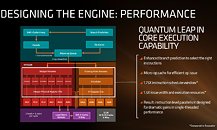
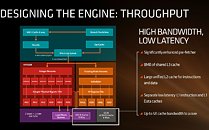
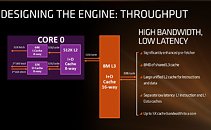
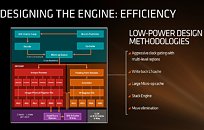
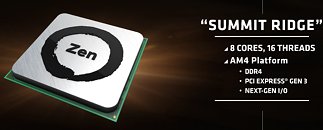
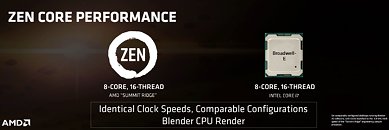
187 Comments on AMD Demos Breakthrough Performance of the ZEN CPU Core
"No no, AMD just wanted to make a comparison at 3.0 GHz with equal frequency (by disabling the turbo etc.) to showcase its progress on the architecture side (that's the idea of this first wave of communication from AMD). We did the same thing to compare architectures in our tests"
Even if we are supposing that zen will not get clock as high as intel, the price will certainly be great for the performance. And 3D rendering is great to mesure up brute speed.
I think the first gen of Zen will be a mixed bag of great 4C/8T and 6C/12T CPUs for decent price that will win them some market share back, but I think they are going to fumble the 8C/16T somehow.
ark.intel.com/m/products/94196/Intel-Core-i7-6900K-Processor-20M-Cache-up-to-3_70-GHz#@product/specifications
Turbo is anything from 3.3-4.0 depending on core usage. In theory AMD had a prerelease cpu that was set to 3ghz and wanted to compare it to an Intel at the same speed. AMD may not have final turbo numbers finished on their prerelease product, but hurry up and base every decision you will make AMD on a cpu that isn't out and a single slide from a PR show.
...........saw you avatar and thought you were that other guy (he's AMD given human form)
sometimes I care about it: which chip completes the task in a given time frame with the least power and heat.
so while the demo was technically interesting. what I'm going to consider is if I spend $x which will be faster and if chip b costs $400 more will I see that performance realized in saved time.
Wait...is it 8MB L3 per module of 4 cores? That's much better.
Clocks were held at 3.0GHz.
1. How much can that 3.0 Ghz chip be overclock(and how easily)
2. Price point match up, do they take this and kick intel in the balls by pricing a 1100 Intel chip at 300 US.
Answer those two questions, and we'll see what real value you have here.
Valid Points Intel Fans will make;
Broadwell-E is has been out for a few months, and we have no idea when Zen will be street available.
Valid Points AMD Fans will make;
This is just a starting chip for them, who knows what's coming after, and this is a hell of alot better than the Bulldozer/Thuban era. Competition benefits everyone by making prices come down. The only people not rooting for AMD are people with more money than sense.
2. Based on recent behavior for pricing at AMD, they'll likely go somewhere directly between that. They simply have to be able to meet demand, and that's not going to be easy for them if its good and if they price it too low. If they can match Intel performance and clocks, they are best to simply slightly undercut intel across the board. That might not be the best for enthusiasts, but its best for AMD for sure.
Maybe?